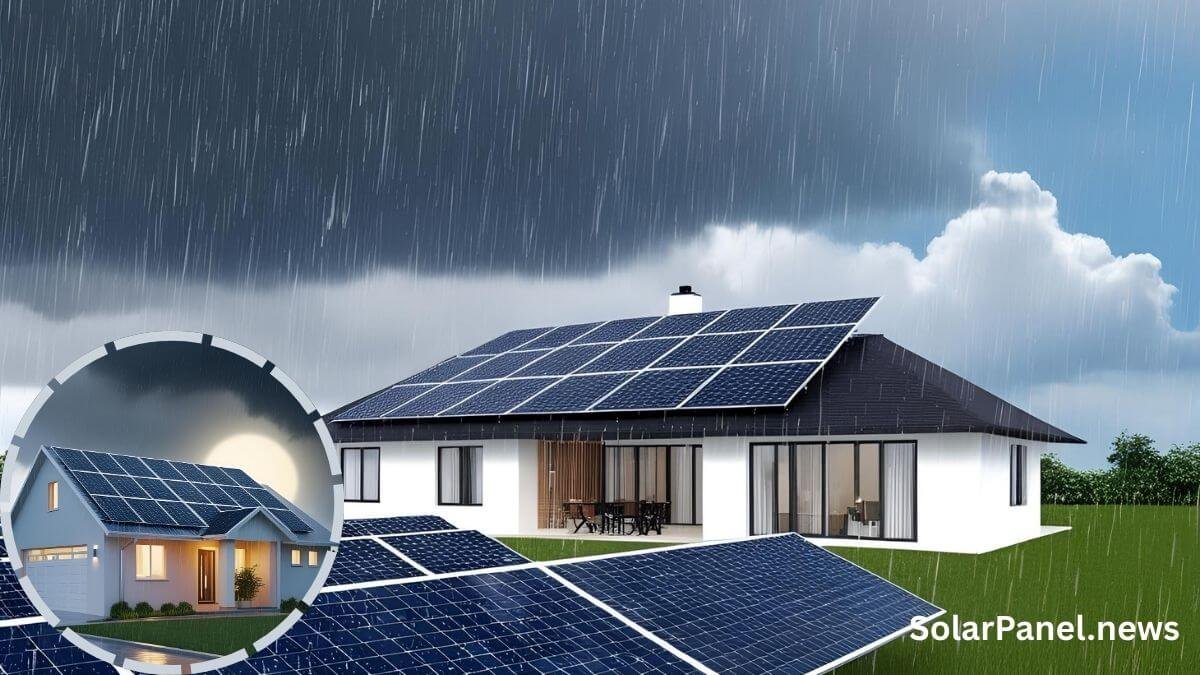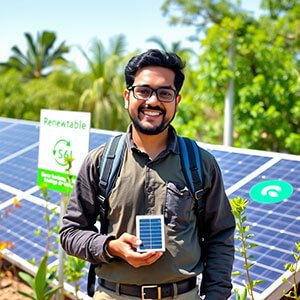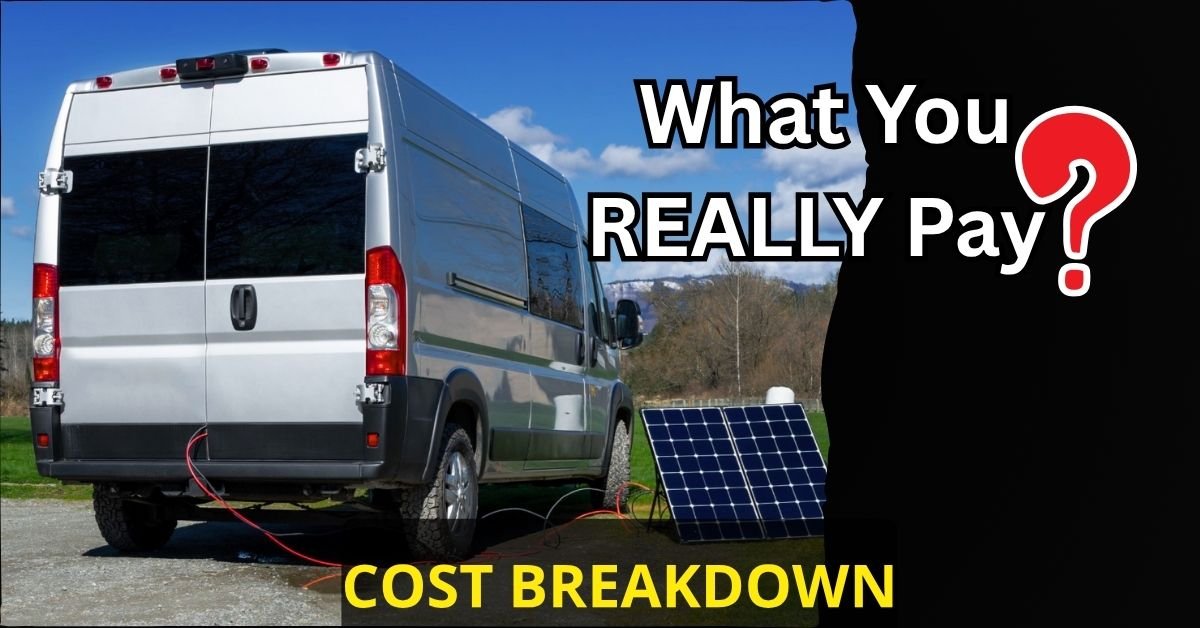Can Solar Panels Work During Rain or at Night time? Imagine waking up to a rainy morning and wondering, “Will my solar panels still generate power today?” Or perhaps you’ve questioned whether they work at night. If so, you’re not alone! Many homeowners and eco-conscious individuals are curious about how the weather and the time of day affect solar energy production. It’s time to separate fact from fiction and shed light on how modern solar technology works, rain or shine, day or night. Let’s uncover the reality.
How Solar Panels Generate Energy
Solar panels convert sunlight into electricity using photovoltaic (PV) cells. When sunlight hits these cells, it knocks electrons loose, creating an electric current. This process, known as the photovoltaic effect, is the foundation of solar energy production.
Key factors influencing solar panel efficiency:
- Sunlight intensity: Direct sunlight generates the most power.
- Panel angle and positioning: Optimal tilt maximizes exposure.
- Temperature: Surprisingly, extreme heat can reduce efficiency.
Small Point: The more sunlight that hits the panels, the more electricity they produce. But what happens when the sun isn’t shining brightly, or at all?
You can read: How to Build a Small Solar System for Cabin (Best Off-Grid Way).
Can Solar Panels Work During Rain or at Night?
Now, let’s address the elephant in the room: Do solar panels work in rain or at night? The short answer is yes, solar panels can work in the rain, but with reduced efficiency. Here’s why. Here’s a detailed breakdown:
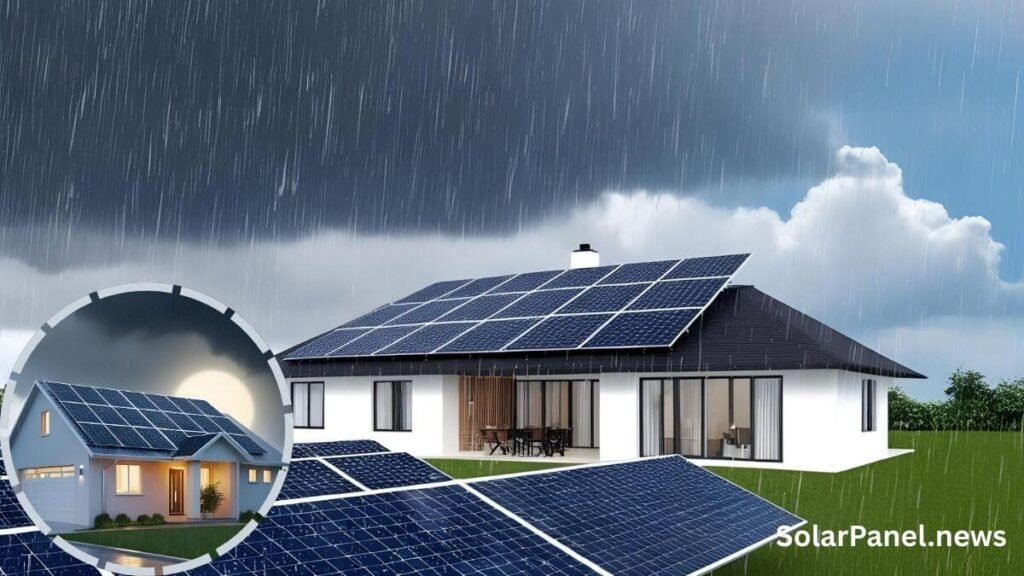
Performance During Cloudy, Rainy Weather
Rainy or cloudy days might seem like a death sentence for solar panel performance, but that’s not entirely true. While it’s true that solar panels produce less energy on overcast days, they don’t shut down completely.
How do They Still Work?
Even on cloudy days, some sunlight penetrates through the clouds. Modern solar panels are designed to capture diffuse sunlight, which is scattered by clouds and atmospheric particles. This means your panels can still generate electricity, albeit at a reduced rate.
Benefits of Rain
Believe it or not, rain can actually be beneficial for solar panels. It washes away dirt, dust, and debris, ensuring the panels operate at optimal efficiency when the sun returns.
Efficiency Stats
On average, solar panels may produce 10-25% of their usual output during heavy rain. The exact percentage depends on factors like the quality of the panels and the intensity of the rainfall.
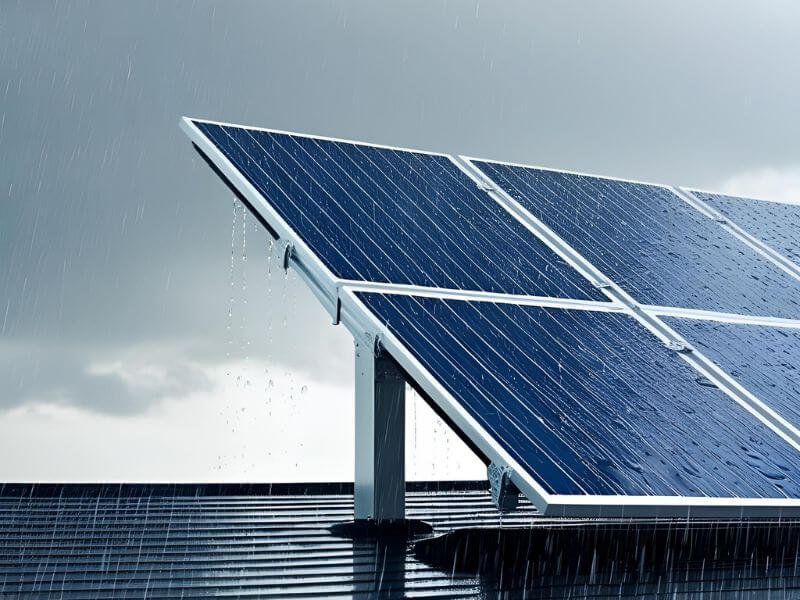
What Happens at Night?
Solar panels do not produce electricity at night because there’s no sunlight to convert. However, that doesn’t mean your home will be powerless!
Solutions for nighttime energy:
- Solar battery storage: Stores excess energy generated during the day.
- Net metering: Sells surplus power back to the grid for credits.
- Hybrid systems: Combine solar with grid or generator power.
Did You Know? Moonlight is far too weak to generate meaningful solar power, despite myths suggesting otherwise.
Role of Batteries and Inverters
To fully understand how solar panels remain functional even when the sun isn’t shining, it’s essential to discuss the role of batteries and inverters.
Batteries: Storing Energy for Later Use
Batteries are the unsung heroes of solar energy systems. They store excess energy produced during peak sunlight hours, ensuring a steady supply of electricity during rain or at night.
Pros of Battery Storage:
- Reduces dependence on the grid.
- Provides backup power during outages.
- Maximizes energy savings.
Cons of Battery Storage:
- High upfront costs.
- Limited lifespan (typically 5-15 years).
Inverters: Converting DC to AC
Inverters play a crucial role in making solar energy usable for your home. They convert the direct current (DC) produced by solar panels into alternating current (AC), which powers your appliances. Without inverters, the electricity generated would be incompatible with most household devices.
Common Misconceptions About Solar Panels
Let’s debunk some myths:
❌ Myth: “Solar panels are useless in bad weather.”
✅ Reality: They still work, just less efficiently.
❌ Myth: “They generate power from moonlight.”
✅ Reality: Moonlight is 400,000 times weaker than sunlight, nowhere near enough.
❌ Myth: “You’ll always lose power at night.”
✅ Reality: With batteries or net metering, you can stay powered 24/7.
❌ Myth: ”Solar panels only work during daylight hours.”
✅ Reality: With battery storage or net metering, your home can stay powered at night.
❌ Myth: “Cloudy places can’t use solar.”
✅ Reality: Countries like Germany and the UK have thriving solar markets despite less sun.
Final Thoughts,
So, do solar panels work in rain or at night? The answer is nuanced:
- Rainy days? Yes, but with lower output.
- Nighttime? No, but batteries and net metering fill the gap.
If you’re considering solar, don’t let weather myths hold you back. Modern systems are designed to keep your home energized, rain or shine!
In a word: With the right setup, you can enjoy reliable, clean energy 24/7, no matter the forecast.
Related Post: How to Clean Solar Panels the Right Way (Without Damaging Them)?
Ready to generate electricity from the sun? Contact a trusted solar provider today to explore options tailored to your needs. Take the first step toward a greener, more energy-efficient future!

